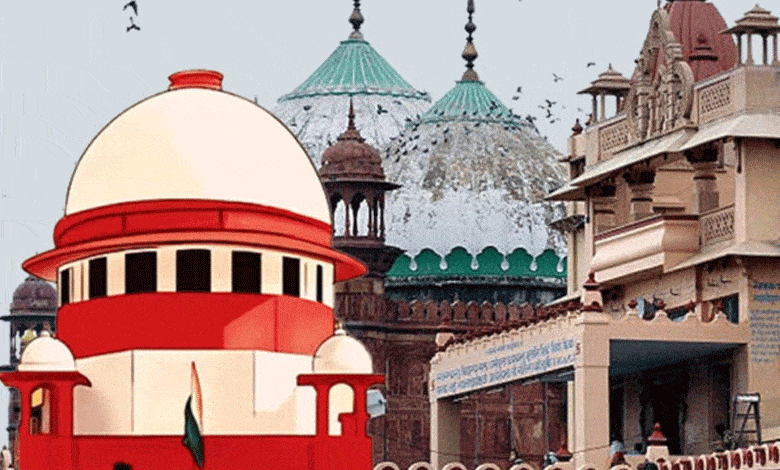Supreme Court Imposes Ban on New Lawsuits Against Places of Worship, Restricts Survey Orders
The bench, comprising Chief Justice Sanjiv Khanna, Justice Sanjay Kumar, and Justice K.V. Vishwanathan, issued this order while hearing several petitions challenging the constitutionality of the 1991 Act. The Act aims to maintain the status of religious places as they were on August 15, 1947, and prevent any changes to their nature.

New Delhi: In a significant ruling, the Supreme Court has directed that no new lawsuits related to places of worship (temples, mosques, or shrines) can be filed until further notice. This decision was made during the ongoing hearing of petitions challenging the Places of Worship (Special Provisions) Act, 1991. The ruling prohibits the lower courts from issuing any survey orders or interim orders that might alter the status or nature of any religious site.
The bench, comprising Chief Justice Sanjiv Khanna, Justice Sanjay Kumar, and Justice K.V. Vishwanathan, issued this order while hearing several petitions challenging the constitutionality of the 1991 Act. The Act aims to maintain the status of religious places as they were on August 15, 1947, and prevent any changes to their nature.
The hearing was based on petitions filed by various parties, including the Jamiat Ulama-i-Hind, which advocated for the full enforcement of the 1991 Act. Advocate Dushyant Dave, representing Jamiat Ulama-i-Hind, argued that the ongoing cases against places of worship, such as the Gyanvapi mosque, Mathura Shahi Idgah, and Sambhal Jama Masjid, should be dismissed. However, the Supreme Court refused to stay the hearing of these pending cases.
The Court also instructed the Union Government to file a response within four weeks on the petitions challenging the Act. Additionally, the Court directed that the Union Government’s affidavit be made available to the public by uploading it to a website, allowing anyone to access and download the document.
The petitions challenging the 1991 Act, including one filed by Ashwini Kumar Upadhyay, who sought to alter the status of places of worship, have sparked significant debate across the country. These petitions gained further attention after the controversial survey of the Sambhal Jama Masjid in Uttar Pradesh, which led to police violence and public protests.
Also Read: Gachibowli Flyover: Govt Approves Budget Hike for Key Project
In response to the ruling, President of Jamiat Ulama-i-Hind, Maulana Mahmood Asad Madani, emphasized the importance of focusing on the future and ensuring the harmony and unity of all communities in India. He stated that those seeking to search for temples behind every mosque were enemies of national unity and should not be allowed to disrupt the country’s peace.
The Jamiat Ulama-i-Hind played a crucial role in the enactment of the Places of Worship Act in 1991, and Maulana Madani expressed confidence that the law would be fully enforced with their continued efforts. Several political parties, including CPI(M), Indian Union Muslim League, DMK, RJD MP Manoj Jha, and NCP MP Jitendra Awhad, have also filed intervention petitions in support of the Act.
Despite multiple extensions granted by the Court, the Union Government has yet to file its response to the petitions, which has drawn criticism from the petitioners. The Court’s recent action has further fueled the ongoing public debate on the issue of religious site disputes and the preservation of communal harmony in India.
